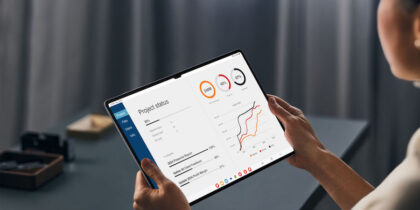Enterprise mobility management is a key technology segment that provides the protection required for secure mobile data. It can be used to control how data is consumed on devices and what can be done with it, such as where it can be sent, therefore providing security for cloud storage as well.
The Roots of Secure Enterprise Mobility
The roots of enterprise mobility controls lie in mobile device management technology, which enforces policies regarding passwords and encryption for data held on a device, and allows organizations to lock or wipe devices that have gone missing.
Enterprise mobility security management takes this a step further by including mobile application management technology, which allows organizations to limit access to applications by blacklisting or whitelisting certain apps, or by enforcing the use of a particular application by classifying it as mandatory.
Another capability that ensures adequate mobile data protection is the provision of sandboxing technology, which provides a granular level of control by enforcing the storage of sensitive information in an isolated section of the device in encrypted form.
The Top Five Factors of Enterprise Mobility Management
According to Nick Rea, a senior director for Samsung Business, the top five tips for mobile data protection using enterprise mobility management tools are to:
- Deploy your mobile fleet on a robust security platform
- Consider the complexity of the deployment and the tools needed to manage that complexity
- Keep enterprise data secure by isolating it in a protected environment
- Consider what’s needed for ease of management throughout the ongoing deployment
- Customize configurations to ensure that devices can be adequately locked down according to the organization’s requirements
However, the most important aspect of mobile data protection is to ensure that your chosen security program causes users the least amount of inconvenience possible without sacrificing the required security features for mobile access to corporate email and other systems.
Built-In Security From Samsung Knox
Samsung Knox provides these capabilities right out of the box, with security built into the hardware and running through to the application layer. This protects the integrity of the operating environment from when the device is booted all the way through its run time. It integrates with many of the enterprise mobility management technologies available in the marketplace, since Samsung partners with most of the major vendors in this space. Through the provision of a wide range of APIs that are provided with Knox, Samsung’s partners can extend its capabilities to provide tools that ease ongoing management concerns, such as enabling authentication with Active Directory for more efficient and secure user access and entitlements management, or for managing VPN connectivity for more secure remote access.
Knox can help simplify many of the complexities of mobile deployments, providing an efficient way to easily enroll multiple devices while ensuring that the correct security policies are enforced according to the type of device and user entitlements.
For keeping enterprise data secure, Knox Workspace allows organizations to separate work and personal data by keeping them in different containers, enforcing encryption where required and ensuring that only work data is wiped if a device is compromised. This eases people’s concerns about losing their personal data while ensuring they can still benefit from the use of just one device for all of their needs.
While Samsung Knox provides a wide range of security capabilities needed for efficient and secure enterprise mobility management, it also gives organizations the ability to customize devices according to their needs. Through provision of the Samsung Knox Customization SDK, organizations can customize their devices to suit the environments in which they operate, such as limiting the functionality offered to ensure security in open environments like retail stores, or providing security for tough, outdoor environments, such as the military.
Every organization today must provide flexible mobile working environments for their employees and other users of their network without compromising the security of enterprise data. The capabilities provided for enterprise mobility management platforms help to ensure that these requirements can be met.
When implementing strong mobile security policies in your business, employees might be the weakest link. Find out why here.





